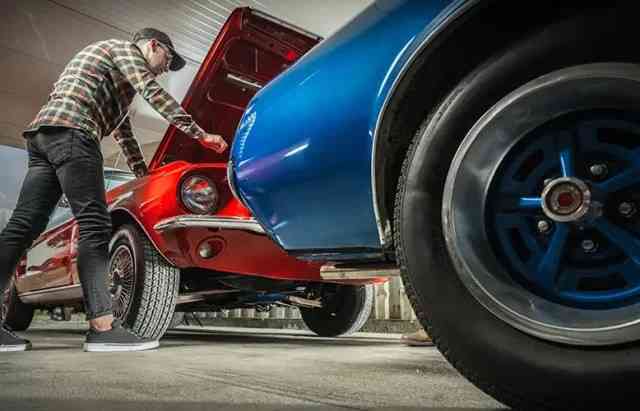Muscle Car wheels is more than just an aesthetic change—it enhances performance, durability, and resale value. Lightweight alloy or forged wheels improve acceleration, braking, and cornering by reducing unsprung weight. Custom wheels also give your car a bold, aggressive look while allowing for better tire options that improve grip and stability.
High-quality materials like forged aluminum or carbon fiber increase durability, making them ideal for aggressive driving or track use. Additionally, well-chosen wheels can boost your car’s resale value. With various styles and finishes available, upgrading your wheels is a practical and stylish investment for any muscle car enthusiast.
| Reason | Description | Estimated Price Range |
|---|---|---|
| 1. Improved Performance & Handling | Lighter alloy wheels reduce weight, improve acceleration, braking, and cornering. | $1,000 – $5,000 |
| 2. Enhanced Aesthetic Appeal | Custom wheels give your car a unique, aggressive look with various finishes. | $800 – $4,000 |
| 3. Increased Resale Value | High-quality wheels make your muscle car more desirable to buyers. | $2,000 – $10,000 |
| 4. Better Tire Options & Fitment | Allows for performance tires, improving grip and stability. | $1,200 – $6,000 |
| 5. Stronger, More Durable Materials | Forged aluminum or carbon fiber wheels provide superior strength and longevity. | $3,000 – $10,000 |
1. Improved Performance and Handling
New wheels can enhance acceleration, braking, and cornering. Lighter alloy wheels reduce unsprung weight, making your car more responsive and agile. Wider wheels provide better traction, helping your muscle car grip the road during high-speed maneuvers.
💰 Estimated Price Range: $1,000 – $5,000 (depending on material and brand)
2. Enhanced Aesthetic Appeal
A fresh set of wheels can dramatically transform your muscle car’s look. Whether you prefer classic chrome, deep-dish, or modern forged wheels, the right set will give your car a bold, aggressive stance.
💰 Estimated Price Range: $800 – $4,000 (custom finishes and designs can cost more)
3. Increased Resale Value
Upgraded wheels make your muscle car more desirable to buyers. Custom wheels that complement the car’s design and performance can boost resale value, especially if paired with high-performance tires.
💰 Potential Value Increase: $2,000 – $10,000 (depending on brand and rarity)
4. Better Tire Options and Fitment
New wheels allow you to upgrade to performance tires, which improve grip, stability, and comfort. Custom-fit wheels ensure proper alignment and prevent rubbing issues, giving your car a perfect stance.
💰 Estimated Price Range: $1,200 – $6,000 (for wheels + high-performance tires)
5. Stronger, More Durable Materials
Factory wheels may not always be the most durable. Forged aluminum or carbon fiber wheels offer superior strength and longevity while reducing weight. If you drive aggressively or take your car to the track, upgrading to stronger wheels can prevent damage from potholes and rough roads.
💰 Estimated Price Range: $3,000 – $10,000 (for high-end lightweight wheels)
Official Link :- LINK
Conclusion
Investing in new wheels for your muscle car is more than just a cosmetic upgrade—it’s a decision that improves performance, longevity, and resale value. Muscle cars are built for speed and power, but they rely heavily on their wheels and tires to maximize that performance. Lightweight, high-performance wheels enhance handling, braking, and acceleration, allowing you to push your car to its full potential on the road or the track.
Beyond performance, new wheels significantly boost your car’s appearance. Custom wheels come in a variety of finishes, from classic chrome to matte black or bronze, allowing you to personalize your vehicle’s look. This level of customization makes your car stand out at car shows, events, or even on the street.
FAQs :-
-
How do I choose the right wheels for my muscle car?
Choosing the right wheels depends on factors such as material (alloy vs. forged), size, weight, and design. Performance-focused drivers should opt for lightweight forged wheels, while those prioritizing aesthetics may choose custom-finished alloy wheels.
-
Do new wheels improve gas mileage?
Yes! Lighter wheels reduce the overall weight of your car, improving fuel efficiency. However, large, heavy wheels may have the opposite effect, so it’s essential to find a balance between size and weight.
-
Can I install new wheels myself?
While some car enthusiasts install wheels themselves, it’s recommended to have a professional mount and balance them properly. Incorrect installation can lead to vibration issues, uneven wear, or even safety hazards.
-
What’s the difference between cast and forged wheels?
Cast wheels are made by pouring molten aluminum into a mold. They are cheaper but heavier and less durable.
Forged wheels are made from a solid piece of aluminum that is compressed under extreme pressure. They are lighter, stronger, and more expensive but provide superior performance. -
How often should I replace my wheels?
Wheels can last for many years, but factors such as road conditions, driving habits, and material quality affect their lifespan. If you notice cracks, bends, or excessive wear, it’s time to replace them.
